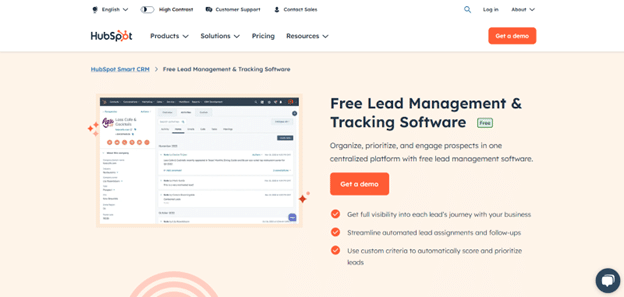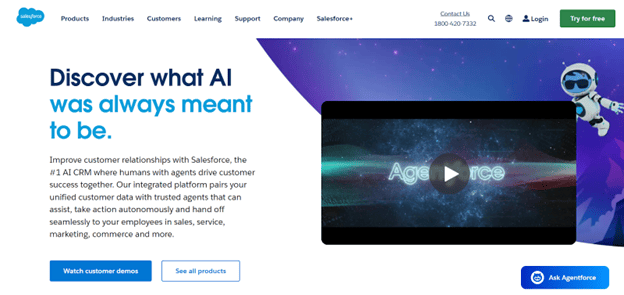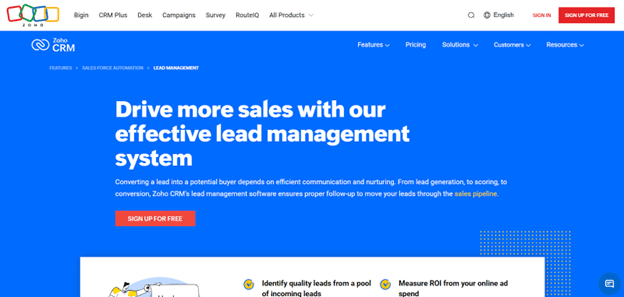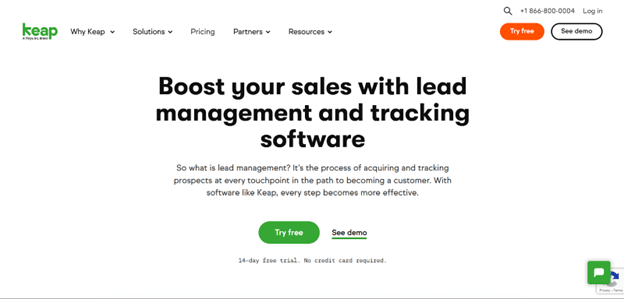Do you think email is outdated? It’s not—email marketing still delivers an average ROI of $36 for every $1 spent, outperforming every other channel.
But here’s what most businesses miss: sending emails is only half the battle. The real magic happens when you combine email marketing with lead tracking.
With the right lead tracking tool, you can:
.
- See who opens, clicks, or ignores your emails.
- Automatically follow up with warm leads.
- Score prospects based on behavior.
- Know exactly when and how to engage.
That’s why we’ve put together a list of the six best lead tracking tools with email integrations—so you can stop guessing and start converting.
6 Best Lead Tracking Tools With Email Marketing Integrations
Now that you know why you should get a lead tracking software with email integration, let’s help you choose the best one for your business:
1. Pipeline CRM (Best Sales CRM)

If you’re looking for a sales CRM that covers everything from lead tracking to follow-up emails, all without bouncing between tabs—Pipeline CRM is built for you.
This all-in-one platform helps you capture, track, and nurture leads at every stage of the sales cycle. You can automate drip campaigns, sync emails with Gmail or Outlook, and monitor every interaction in a centralized dashboard—so no lead falls through the cracks.
Pipeline CRM makes it easy to:
- Map the stages of your sales and assign tasks.
- Score and prioritize leads based on activity.
- Get alerts when deals go cold or need attention.
- Collaborate with your team in real-time.
Whether you’re working solo or managing a growing sales team, everything stays in one workflow—streamlined and organized. You can even customize tools to fit your sales process and automate repetitive tasks like follow-ups or project scheduling.
Key Features:
- Lead management with task prioritization, sales stage mapping, and scoring.
- Automated email drip campaigns tied to lead behavior.
- Centralized dashboard for all lead and email data.
- Sales stage mapping and pipeline automation.
- Real-time alerts and team updates for better communication.
- AI-powered analytics and performance insights.
- Mobile CRM for reps on the move.
- Role-based access for data control and security.
Pros:
- Industry-specific CRM options tailored to your workflows.
- Clean, intuitive interface with a minimal learning curve.
Pricing:
- Start plan: $25/month per user.
- Develop plan: $33/month per user.
- Grow plan: $49/month per user.
- Enterprise: custom.
Visit Pipeline CRM’s pricing page for more information.
Rating:
2. HubSpot CRM (Best for Inbound Lead Management)

We can’t talk about marketing and lead tracking without mentioning HubSpot CRM. One of the leading names among marketing tools, it offers advanced lead tracking features and integrates with popular email marketing tools.
For those without an existing email marketing solution, HubSpot’s built-in tools allow you to design and send personalized emails directly from the CRM, streamlining your outreach efforts.
Key Features:
- Lead tracking across web activity, email engagement, and form submissions.
- Automated email sequences triggered by user behavior.
- Lead scoring to prioritize the hottest opportunities.
- Detailed email analytics right inside the CRM.
Pros:
- The free plan is powerful enough to get started with lead tracking and email automation.
- Seamless integration with HubSpot’s marketing, sales, and service tools creates a centralized tech ecosystem for your business.
Cons:
- Premium plans can be costly, potentially posing a challenge for startups and small businesses.
- The extensive feature set may be overwhelming for users seeking a simple CRM solution.
Pricing:
The Sales Hub Professional features start at $90/month per user, and the Marketing Hub Professional starts at $800/month per user.
Rating:
3. Salesforce (Best for Managing Complex, Multi-Stage Sales Processes)

Salesforce is a powerful CRM platform built for teams managing high volumes of leads and multi-stage pipelines. It combines lead tracking with AI insights and email marketing integrations to support complex sales cycles.
Salesforce lets you capture leads from multiple channels, track interactions across email, web, and CRM touchpoints, and build automated workflows that adapt to each lead’s journey. Its AI assistant, Einstein, helps your team prioritize specific leads and tailor outreach at scale.
Salesforce integrates with Gmail and Outlook, and its Marketing Cloud product offers email automation, personalization, and analytics to keep communication on point.
Key Features:
- End-to-end lead tracking with customizable sales pipelines.
- Email marketing and automation via Marketing Cloud or Account Engagement.
- AI-powered lead scoring and predictive engagement insights with Einstein.
- Real-time activity tracking across web, email, and CRM systems.
- Deep integration with thousands of third-party apps via AppExchange.
Pros:
- Ideal for growing businesses that need in-depth customization and scalability.
- Advanced email automation and analytics for smarter decision-making.
- Massive ecosystem of integrations, tools, and extensions
Cons:
- Requires extensive onboarding time due to its complexity.
- Email marketing and automation features are add-ons that increase costs.
Pricing:
- Starts at $25/month per user (Sales Cloud Essentials).
- Email marketing via Marketing Cloud and Account Engagement is priced separately based on usage and contact volume.
- Custom pricing for enterprise setups.
Ratings:
4. Zoho CRM (Best for Growing Businesses with Limited Teams)

Zoho CRM is designed for small to mid-sized businesses looking for lead tracking and email marketing integrations without the complexity of enterprise-level systems. It enables businesses to capture leads from various channels, automate communications, and maintain organized workflows without extensive IT support.
With Zoho CRM, you can capture leads from web forms, live chats, social media, and even business card scans. Once a lead is in the system, Zoho allows you to track every interaction and execute automated email campaigns based on lead engagement.
Key Features:
- Multi-channel lead capture and tracking.
- Email automation with triggers based on user behavior.
- Lead scoring and workflow automation for better prioritization.
- Detailed analytics and real-time email insights.
Pros:
- Mobile app for convenient lead management.
- Intuitive interface with extensive customization options.
- Advanced features at an affordable price point.
Cons:
- Some users report slower loading speeds.
- Certain advanced functions require additional subscriptions, potentially increasing overall costs.
Pricing:
- Standard: $14/month per user.
- Professional: $23/month per user.
- Enterprise: $40/month per user.
- Ultimate: $52/month per user.
Rating:
5. Keap (Best for Small Businesses and Solopreneurs)

Keap, formerly known as Infusionsoft, is a CRM platform designed to streamline sales, marketing, and customer management for small businesses and solopreneurs. By integrating lead tracking, email marketing, automation, and e-commerce tools, Keap enables users to manage their customer journey from one platform.
Key Features:
- Smart contact tagging and lead tracking with custom pipelines.
- Automated email sequences and personalized campaigns.
- Real-time email engagement tracking.
- Automated scheduling, invoicing, and SMS tools for full-funnel control.
Pros:
- Intuitive automation templates make it easy to set up workflows without technical expertise.
- Its comprehensive feature set reduces the need for multiple software solutions.
Cons:
- The starting price is higher than some competitors, which could be a consideration for startups.
- Some users report a steeper learning curve due to the platform’s extensive features.
Pricing:
- Lite Plan: $129/month.
- Pro Plan: $199/month.
- Max Plan: $299/month.
Custom pricing is available for businesses with more than 500 contacts.
Ratings:
6. Engagebay (Best AI-Powered Lead Management Tool)

EngageBay is an all-in-one CRM platform that uses AI to streamline marketing, sales, and customer support processes. It offers a suite of tools, including lead tracking, email marketing, automation, and customer service features, all accessible from a single dashboard.
Key Features:
- Capture leads, assign scores based on engagement, and monitor their journey through the sales funnel.
- Design, automate, and track email campaigns with AI-powered tools.
- Email integration with Gmail and Outlook.
- Free live chat software to engage with customers in real time.
Pros:
- The free pricing plan is generous, with basic features like email marketing and CRM.
- Provides a wide range of features at competitive pricing.
Cons:
- Users have reported occasional lags, particularly during bulk actions and campaign statistics generation.
- The platform’s email template options are somewhat restricted and may require customization to meet specific branding needs.
Pricing:
- Basic: $12.74/month per user.
- Growth: $55.24/month per user.
- Pro: $101.99/month per user.
Rating:
- G2: 6/5 stars (470+ reviews).
- Capterra: 7/ 5 stars (880+ reviews).
Now that you’ve seen the top tools out there, let’s talk about why combining lead tracking with email marketing integrations works so well—especially if your goal is to close more deals faster.
Whether you’re nurturing cold leads or capitalizing on warm ones, the real power of these platforms comes from how they work together. Here’s why using a unified system is a game-changer.
Why Lead Tracking Works Better With Email Marketing Integrations
Using separate tools for lead tracking and email campaigns often results in missed opportunities. Combining both in one platform is a faster, smarter way to boost your sales productivity.
Leads Don’t Follow Up on Themselves
A lead is only valuable if you act fast. But jumping between your lead tracking tool, sales CRM, and email platform slows everything down.
When your CRM software includes email marketing integrations, you can:
- Trigger follow-ups right from your lead tracking dashboard
- Automate drip campaigns based on behavior
- Keep your pipeline moving without manual effort
Whether it’s a welcome email, a reminder, or a timely nudge, your platform handles the outreach — so you can focus on closing.
Track Every Click, Open, and Action
With integrated tools, you can see the full picture: who opened your email, what they clicked, and what they ignored.
This kind of insight:
- Helps you score leads with more accuracy
- Shows you who’s ready to buy (and who’s not)
- Gives your team a real edge in pipeline management
A unified system makes it easy to spot and act on high-intent behavior.
Smarter Segmentation Equals Better Results
Not all leads are the same. Some need nurturing. Others are ready now.
With email marketing integrations, you can segment leads based on:
- Opens and clicks
- Interests and past behavior
- Funnel stage
That powers sharper email personalization, more relevant messaging, and better conversion rates — all backed by your lead tracking data.
Automate the Tedious Things
Manually sending personalized emails doesn’t scale.
With email automation built into your lead tracking tool, you can:
- Trigger drip campaigns for new signups
- Re-engage cold leads automatically
- Set sequences once and let them run
It’s not just convenient — it’s a big boost for sales productivity.
One Platform for a Streamlined Workflow
Switching between tools is inefficient and risks letting leads fall through the cracks.
With lead tracking and email marketing integrations in one platform:
- Your lead data, email activity, and engagement metrics stay in sync
- Your sales CRM becomes your single source of truth
- You spend less time managing tools and more time closing deals
It’s a cleaner, more reliable way to stay organized and move leads through the funnel.
The Best Lead Tracking CRM with Email Marketing to Close More Deals
Choosing the right lead tracking software with email marketing integration can make the difference between a bloated contact list and a high-converting sales pipeline. While all six tools offer strong capabilities, the best option is the one that actually helps you work smarter—not harder.
If you’re tired of juggling disconnected tools or manually following up with leads, Pipeline CRM offers a clean, intuitive, sales-focused CRM that brings everything together.
Choose a CRM designed to help you track leads, send better emails, and close more deals—without the busy work. Try Pipeline CRM for free and experience a more productive, less stressful way to manage your leads and email outreach.



